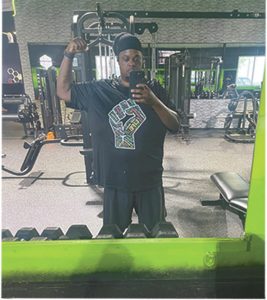 Howard Young Jr., 36 years old, was born and raised in Sarasota, FL. He recently underwent bariatric surgery with Stelios Rekkas, MD, FACS, FASMBS at Manatee Memorial Hospital. We had the opportunity to sit down with Howard and discuss his experience.
Howard Young Jr., 36 years old, was born and raised in Sarasota, FL. He recently underwent bariatric surgery with Stelios Rekkas, MD, FACS, FASMBS at Manatee Memorial Hospital. We had the opportunity to sit down with Howard and discuss his experience.
A few years ago, I started to gain a lot of weight. I was working all day and creating bad habits for myself. During this time, I was a Type-2 diabetic. I initially connected with Dr. Rekkas and began preparing myself for bariatric surgery. I completed all my pre-op clearances and was ready. Unfortunately, soon before the surgery, I caught COVID-19. My situation was extreme, and I was in a coma for a total of two and a half months. There were some complications with treatment and both of my legs had to be amputated due to necrosis. Once I came to the realization of what happened, I began to suffer with deep depression and anxiety, and I couldn’t hold it together for quite a while. It took some time, but I slowly started to regain my confidence.
I waited about a year and a half before I went back to see Dr. Rekkas. I had to complete many doctor visits to be sure I was healthy enough to be a candidate for surgery again. I redid all my tests and went through the pre-surgical criteria for the second time. I had to lose 25-30 pounds before I could have the surgery, and Dr. Rekkas and I agreed that the robotic sleeve gastrectomy would be the best option. I will admit that I was somewhat scared this time around but was determined. I could not believe I got to the point where I was going to be able to have this done.
After the surgery, I woke up in the recovery room and was in some pain. I also experienced some nausea and vomiting, but after the initial day it was bearable. I was in the hospital for about two-three days. During my stay, my care was absolutely wonderful. When I was there, I felt like I was home. I did not have anything to worry about. I cannot thank the hospital, Dr. Rekkas and his team enough. As a matter of fact, I recommended Dr. Rekkas to my cousin for surgery.
After my recovery period was over, I got back into the gym. I’ve been with a trainer and weight lift four times a week. I don’t feel as though I am tired all the time, my eating habits have changed, and my focus has improved. The weight loss has been a huge factor in helping me walk with my prosthetic limbs. The more weight I lose, the easier life has become for me. I was in a dark place, but I feel very free and full of life now. I feel different, but in a good way. I also don’t have to take nearly as much insulin for my diabetes and I no longer have sleep apnea. My goal is to lose 40 more pounds and then I should be able to come off my diabetes medications completely.
Everyone goes through their chapter as I have been through mine. I’ve noticed that there are obstacles that I can climb now that maybe I was not able to back then and I hope people take away that message.
If you are interested in learning more about surgical weight loss options, contact Manatee Weight Loss Center at 941-896-9507.
Individual results may vary. There are risks associated with any surgical procedure. Talk with your doctor about these risks to find out if bariatric surgery is right for you.
Weight Loss Options
Robotic Sleeve Gastrectomy vs.Laparoscopic Gastric Bypass
A robotic sleeve gastrectomy and gastric bypass are different weight loss procedures but have the same overall goal. That goal is to help restrict the amount of food you can consume. Dr. Rekkas’ years of experience in bariatric surgery has shown the following results for weight loss and complications.
Robotic Sleeve Gastrectomy
During a robotic sleeve gastrectomy, your stomach is reduced by 60-80%, which means your stomach is now smaller and can’t hold as much food. Patients can expect to reduce their excess weight by 60-80% within one-two years after their procedure. There is a 1-2% risk of serious complications with this procedure.
Gastric Bypass
During minimally invasive gastric bypass, the surgeon will create a small pouch from the top of your stomach and attach it to your small intestine. Your stomach will hold less food, and you will feel full faster. Patients can expect to reduce their excess weight by 80-85% within one-two years after their procedure. There is about a 5% risk of serious complications with this procedure.
941-746-5111 | manateememorial.com
Source: msaweightloss.com
Physicians are on the medical staff of Manatee Memorial Hospital, but, with limited exceptions, are independent practitioners who are not employees or agents of Manatee Memorial Hospital. The hospital shall not be liable for actions or treatments provided by physicians. For language assistance, disability accommodations and the nondiscrimination notice, visit the hospital’s website.









